View this post on Instagram
Maybe it goes without saying, but Ben Tracy has seen some serious sh*t.
The handsome Minnesota native studied at Marquette University before landing his first job at the CBS affiliate WCCO-TV. His reporting on the methamphetamine crisis earned him national prominence, and eventually a spot on the national CBS News team. Following two years as White House Correspondent during the Trump Administration, he landed a job as Senior Climate Correspondent for the network. Since leaving Washington, he’s conducted feature reports on renewable energy, climate change, electronic vehicles, and natural disasters. Oh, and along the way he picked up a whopping six local Emmy Awards and two Alfred I. DuPont-Columbia Awards honoring excellence in broadcast news.
We caught up with Tracy just before Earth Day to discuss how to best curb climate change, his career, and life as an openly gay man in broadcasting.
So you, like all of us, survived four years of White House crazy. How did you end up as a climate correspondent?
How about we take this to the next level?
Our newsletter is like a refreshing cocktail (or mocktail) of LGBTQ+ entertainment and pop culture, served up with a side of eye-candy.
Well I survived two years of the Trump White House, but it felt like four. It’s kind of like dog years.
[Laughter]
Everything feels longer than it normally would. I always say two years of covering the Trump Administration was like covering two terms of someone else. It’s non-stop news. Those two years there were two impeachments, racial unrest, an attack on the Capitol, then all the other stuff in the middle. So we never lacked for news. So it is a bit of whiplash going from the White House to covering climate. Just in two months of doing this, I love it. To get back out into the world, to be talking to people, out on a boat in Maine and talking to lobstermen, that’s kind of what I’m passionate about and always have been.
Carbon dioxide levels are higher than they've been at any point in the last 3.6 million years https://t.co/YR4d1H2MAU via @CBSNews
— Ben Tracy (@benstracy) April 8, 2021
That’s wonderful.
When I look back, I am grateful for the time I had in the White House. I learned so much, and it made me stretch my abilities. But this is much closer to my core strengths and interests. Climate and the environment is something that I’m very passionate about and wanted to do more stories on. I mentioned that to my bosses at CBS, and they were like that’s amazing, we want more of this. So it was pretty cool how it all came together.
So, is it clear, the #1 threat to the climate right now? Or is this a multi-pronged battle?
It’s definitely a multi-pronged battle. It’s going to take a lot of solutions; there’s not one silver bullet to solve the problem. If you want to label enemy #1, it would obviously be greenhouse gasses, the gasses warming the planet. The one that is doing that to the largest degree is carbon dioxide. That’s coming out of our cars, our power plants, our homes, our farms. There are so many stories to tell on this, and I think the hard part—and I know full well I still have so much to learn on this topic. I’ve only been at it two months, and I feel like I’m back in climate college. I’m reading non-stop books and articles every day to make myself smarter on this topic.
Good to hear.
It’s going to take a lot of different solutions. We’re past the point where there’s no one thing a person can do. We’re really going to have to change our systems. You mention the story on GM. It really is going to take a full switch over from gas-powered vehicles to electric ones. But then, the question is how are you charging those? Are you using power from a coal fire power plant? Because then you’re not really solving the problem. So there are a lot of different steps.
US automakers says the future is electric and change is coming fast: https://t.co/FFv7GFJo6j
— Ben Tracy (@benstracy) April 6, 2021
So it’s Earth Day. I thought this was appropriate, given that you’re a queer climate correspondent.
I love that! Can I put that on my business card: “queer climate correspondent?”
Please do.
[Laughter]
Use it own, it. But the point of this question. What’s the one thing we can all do to curb climate change?
The thing I would tell most people is to start educating ourselves on this topic. This is so far beyond recycling, which is important and which we all should be doing. I did read a really interesting article today that said one of the biggest things we can focus on as individuals is our food.
Interesting.
If we stop wasting food—throwing out food we don’t use—and eating less meat, those are two of the biggest things an individual can do. Every time we go to the grocery store and a few days later decide we didn’t get to that chicken in the fridge and we toss it out, think about what went into raising that animal, and all the emissions that went into that. Trucking it to a supermarket, putting it in your refrigerator, then putting it in the trash where it goes to a landfill and produces methane. So there’s a big cycle to that. I think if we all stepped back and thought more deeply—which is something I’m trying to do myself.
I know in addition to your political and climate work you’re also somebody that’s been critical of cable news in the past. Cable news gets a lot of criticism for not so much reporting the news as offering nonstop—and often confusing—commentary on current events. That’s part of the infodemic—people just believing what they want to, and only absorbing information that will reinforce their own confirmation bias. What role do you feel that cable news plays in the infodemic? Does it make things worse?
I think it depends on the topic. I think there’s a lot of good work done on cable news. CNN has done a lot of great work when it comes to climate. Bill Weir is somebody that I have looked at his work and really admired it. They devote time to it. So there are aspects of cable news, just because of the sheer amount of real estate that they have in a day, they can do in-depth if they want to. But when it’s just two people with different opinions hashing it out on a set, I don’t know how much anyone is getting out of that. When it comes to something like climate issues, it does a huge disservice.
Sure.
It does lend to that belief that there are two sides to this issue, when really there are not and have not been for decades in the scientific community. There certainly are debates over solutions or what will have the most impact, but debating climate change as something that exist should not be fodder for any serious news story at this point.
I want to ask too because you are with a network, how would you feel about reinstating the Fairness Doctrine, or something similar to help curb misinformation?
I think it’s larger than traditional media, and I lump cable and broadcast into that.
Ok.
I think a lot of misinformation—a lot of disinformation—is coming from social media. A lot of it is people just seeking out information they might have heard or want to believe. Everyone can be in their own bubble for better or worse now. I think it’s beyond hanging that on a certain cable news channel or media outlet. I don’t know how we put that genie back in the bottle, but God, it’d be lovely. It’s dangerous.
Indeed.
And we see it play out now with vaccinations and how people wear masks, or whether COVID was even real. There are always people inclined to believe conspiracy theories, but we’ve seen how that can really take off if people in your own circle or people you trust are saying the same things and repeating them. You’re much more susceptible to believing something if you hear it from someone you trust.
I want to ask a bit about being a gay man in broadcasting. Have you been out throughout your career?
I have not. I’m now old enough now and my career spans back long enough to a time when I was not comfortable to be open about who I am as a gay man. In my first couple of jobs I was not really open about my sexuality with my colleagues and bosses. Some of that—it was the late 90s. Society was different then. And I had limiting beliefs as to what it would mean for my own career. What I always wanted to do back then—and my aspirations have changed over time—but I wanted to be a morning news anchor.
Interesting.
What is the model that we always saw for generations on network morning news? A man and a woman set up to be this happy couple in the morning. In my head, as someone who was young, I always thought I can’t do that job if I’m the gay guy. Now, thank God, the world and TV news and everything has changed since then. You have shows that are anchored by two women. You have out, gay men anchoring their own shows. So that’s changed over time.
Lucky for us.
I also realized after I did come out to my colleagues and open about my partner and my life—I’d always been that way with friends and family for a long time before I was out at work. But it really enriched my life if I’m being honest. It wasn’t that I was lying about them, but you kind of lie by omission when you don’t bring things up. And to have that whole part of your personal life when you’re talking to your colleagues be part of your professional life when you talk to colleagues makes a huge difference. I also think it makes a big difference for me in terms of connecting with people in our stories.
Really?
There were so many times when I’d interview people and they’d ask “Are you married?” And it’s a curious question. It was easy for me to say no, even before gay marriage was legal. I’m still not married to this day. Now it’s nice when someone asks if I’m married for me to say “I have a partner.” And I now feel like I go out of my way to someone if someone engages me in that way. You never know what will connect with someone.
Right.
I will say I had an interesting experience in the last couple of years. I was living in China and went to North Korea three times for work.
Good lord.
It was the first time in, oh God, 15? 20 years? I had to put myself back in the closet because it’s not accepted in that society. It was a really interesting experience. I realized that how used to being out and not even thinking twice about those things I was until I was in that environment. It was a place where it was ok not to share the details of my life.
Wow, we could do a whole interview on that. I’d love to sometime.
Yeah.
For now though, how do you feel your experience as a queer man affects your approach to a story? Does it attract you to certain subjects?
I don’t know that it draws me to particular stories or topics. I will say that my experience of being part of a minority in this country makes me more compassionate.
Wonderful.
You can never experience somebody else’s world view, but you can understand it more if you’ve been in a situation where opportunities are not possible for you, or you’ve felt unable to share who you really are with people. So I think it has helped with my personal connection with people I come into contact with within my work.
So then, you’re in a relationship with your boyfriend Mark Gustafson for eight years. How does being a celebrity journalist affect your personal life? You travel, you’re busy at all hours of the day and night, you’re putting yourself in danger…
Well, thank God he’s very supportive, to the degree to which we were living in Los Angeles. I had been in LA for more than eight years. He’d moved out. He’s a consultant for Deloitte. We had a very comfortable life. Then my boss called me up one day and said “I think you’re a little bored. I think it’s time for something new. What would you think about moving to Bejing?”
Wow.
So I said to Mark that night “I had an interesting phone call.” After many conversations, he looked at me, and he said “I think this is something you need to do. If you don’t, you’ll regret it.” And he knew full well what that meant for him: a lot of time apart. But he actually took a leave of absence from his job and came over and lived with me in China for six months. It was amazing to have that experience with him. He could understand [my work] in a way that he would never have been able to otherwise, even if he had just come and visited. So certainly, he’s more worried some times more than others. North Korea would fall into that, or covering natural disasters.
Naturally.
But people who decide to be with news people long-term just kind of get used to it. They know the phone is going to ring at strange hours of the day, or that you’ll have to hop on a plane and birthday plans will be canceled. Thankfully, he’s a wonderfully understanding person who is very busy in his own right.
Ben Tracy is chief Climate Correspondent for CBS News.
Today, the U.S. officially rejoins the Paris Climate Accord.
America is the second largest emitter behind China of greenhouse gases that are warming the planet.@BensTracy spoke exclusively with former Sec. of State @JohnKerry, who is now the Biden admin's @ClimateEnvoy. pic.twitter.com/axnOvMOLp6
— CBS This Morning (@CBSThisMorning) February 19, 2021



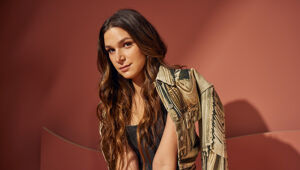
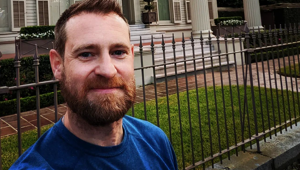




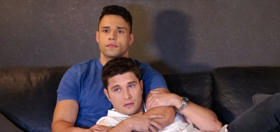

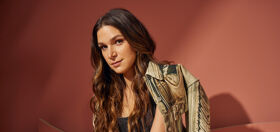


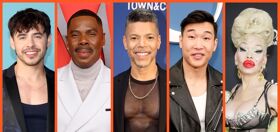


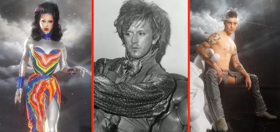
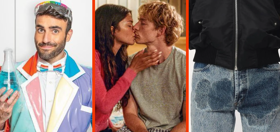
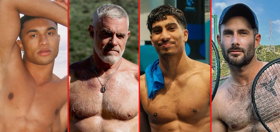

JessPH
I watch him almost every night on CBS Evening News. I have no idea that he’s gay. It’s good to know that he is.
Manrico Jimenez
He’s a fine mofo